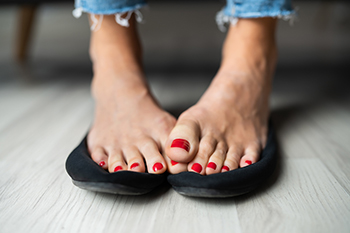Ways to Cope With Sweaty Feet

Having sweaty feet can happen to anyone, especially at the end of the day when your socks have been cooped up in shoes all day. However, some people suffer from a condition called hyperhidrosis of the feet, or sweaty feet. This can be caused by overactive sweat glands, a genetic disorder, and hormonal changes. Because the feet have 250,000 sweat glands, more per inch than any other body part, having hyperhidrosis can turn into an embarrassing problem, namely foot odor. This is the result of bacteria breaking down the sweat and emitting a foul odor. For that reason, following a daily foot hygiene routine is extremely important for anyone with hyperhidrosis. A few tips for coping with sweaty feet include using anti–bacterial soap when washing your feet and applying absorbent foot powder. It is also suggested by experts that you give your shoes a chance to air out and alternate pairs daily. Switching to socks that absorb moisture and using medicated insoles in your shoes are other common coping methods. If none of these measures help, it may be time to consult a podiatrist who can offer more advanced treatment solutions, such as Botox injections and low-power electric current therapy.
If you are suffering from hyperhidrosis contact Anthony Ricciardi Jr., DPM of Foot & Ankle Specialists of Nevada. Our Doctor can provide the care you need to attend to all of your foot and ankle needs.
Hyperhidrosis of the Feet
Hyperhidrosis is a rare disorder that can cause people to have excessive sweating of their feet. This can usually occur all on its own without rigorous activity involved. People who suffer from hyperhidrosis may also experience sweaty palms.
Although it is said that sweating is a healthy process meant to cool down the body temperature and to maintain a proper internal temperature, hyperhidrosis may prove to be a huge hindrance on a person’s everyday life.
Plantar hyperhidrosis is considered to be the main form of hyperhidrosis. Secondary hyperhidrosis can refer to sweating that occurs in areas other than the feet or hands and armpits. Often this may be a sign of it being related to another medical condition such as menopause, hyperthyroidism and even Parkinson’s disease.
In order to alleviate this condition, it is important to see your doctor so that they may prescribe the necessary medications so that you can begin to live a normal life again. If this is left untreated, it is said that it will persist throughout an individual’s life.
A last resort approach would be surgery, but it is best to speak with your doctor to find out what may be the best treatment for you.
If you have any questions please feel free to contact our office located in Las Vegas, Nevada . We offer the newest diagnostic and treatment technologies for all your foot and ankle needs.
